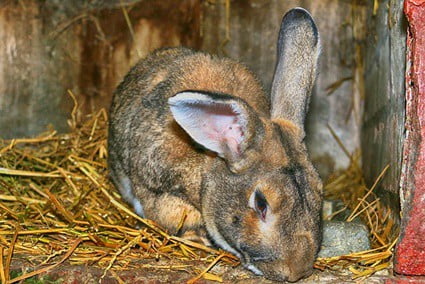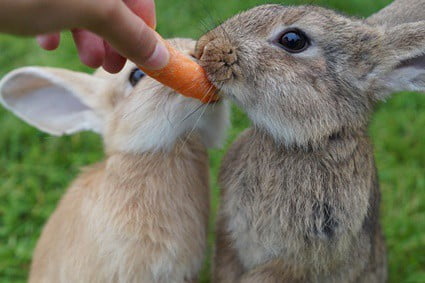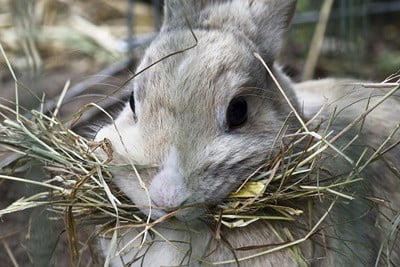Eating a balanced diet is essential to the health of rabbits (lagomorphs). This means that rabbits need to eat the right balance of proteins, fats, vitamins, minerals, fiber, and carbohydrates.
Carbs are a rabbit’s primary energy source. This nutrient is also key to aiding several important biological processes. If a rabbit does not ingest enough carbohydrates, its body will not function optimally. Conversely, if a rabbit eats too many of the wrong types of carbohydrates, it will likely develop gastrointestinal problems.
It is also crucial that owners do not cut out carbs from a rabbit’s diet to help it to lose weight. A rabbit’s main food sources primarily consist of carbs. If your rabbit is overweight or obese, it should be encouraged to exercise and play more often rather than taking away its critical food sources.
Carbohydrates And Rabbits
Carbohydrates are essential sources of energy for rabbits. This nutrient is made up of various sugar molecules produced by plants via photosynthesis.
Carbs can be classified as either simple or complex. Simple carbohydrates provide short bursts of energy at a time. Complex carbohydrates, on the other hand, take much longer to digest and therefore provide rabbits with more energy over a sustained period of time.
The energy that rabbits receive from carbohydrates is not only spent on moving around and playing, but on aiding other significant biological functions as well. This includes the following:
- Protein synthesis
- Creation of new tissues
- Maintenance and repair of existing tissue
- Digestion and absorption of nutrients
- Appetite stimulation
Carbs abound in foods like bread, pasta, rice, and other similar foods. Of course, rabbits do not eat these foods, so where do rabbits get carbohydrates from?
What Rabbit Foods Contain Carbs?
The main sources of carbs for rabbits come from grass hay (primarily), vegetables, and fruits. These foods contain different types of carbs:
- Simple sugars
- Starches
- Fibers
Each type is broken down in the rabbit’s digestive system in different ways. Because simple sugars are made up of simple carbohydrates, they do not take long for a rabbit to digest or use up.
Starches are complex carbohydrates, which means they will take longer for an adult rabbit to digest and fully use.
Fiber is a special complex carbohydrate because it is not fully digested by the rabbit’s digestive tract. Rather, its function is to aid in digestion by pushing waste further along the digestive tract.

What Sugars Can Rabbits Eat?
According to UC Davis, fruits and vegetables can be classified as simple sugar carbohydrates. However, only certain fruits and vegetables are safe for rabbits to consume.
This is because some fruits and vegetables have higher concentrations of sugar than others. While tiny amounts of sugar can be found in feed produced for rabbits and in fruits and vegetables, giving them too much sugar can lead to sickness and obesity. So, which foods should be given as meals, and which only as an occasional rabbit treat?
| Fruits Rabbits Can Eat | Veg Rabbits Can Eat |
|---|---|
| Apples (Don’t feed rabbits apple seeds, as they are toxic for the animals) | Alfalfa |
| Bananas (high in sugar; limit to treats) | Beet greens |
| Blueberries | Radish and leaves |
| Grapes (high in sugar; limit to treats) | Broccoli |
| Papaya | Carrots and tops (high in sugar; limit to treats) |
| Peaches | Chicory greens |
| Pears | Romaine lettuce |
| Pineapple | Collard greens |
| Raspberries | Dandelion greens |
| Strawberries | Kale |
| Mustard greens | |
| Parsley | |
| Watercress |
Can Rabbits Get Carbs from Herbs?
Rabbits also enjoy eating certain herbs like mint, basil, rosemary, and anise. However, these should only be given in small amounts (1 sprig per day).
According to Rivers State University of Science and Technology, spices and herbs can have as much as 34.6 to 71.9 percent total carb content. It is easy for a rabbit to overload on the carbs found in herbs and become sick.
What Vegetables Are Bad for Rabbits?
There are some vegetables and plants that rabbits cannot eat. While many of these vegetables are classified as complex carbs, it is important for rabbit owners to know what to avoid nonetheless. A rabbit will lead a full and healthy life if it does not eat any of the following vegetables:
- Beans
- Beets
- Cabbage (causes gas)
- Coffee/tea leaves or plants
- Green beans
- Onions
- Peas
- Rhubarb
- Spinach
Rabbits should be fed a high fiber diet that consists of grass hay. A rabbit’s digestive system is not wired to digest large amounts of sugars or fats.
Can Rabbits Eat Starches?
Starches are a complex carbohydrate mainly found in seeds, tubers, or roots of plants. Any foods that contain these starches are then considered starches, too.
Unfortunately, most starches can make young or adolescent rabbits extremely sick and should be avoided. You should also refrain from feeding rabbits any starchy human foods such as:
- Bread
- Pasta
- Cereals
- Nuts
- Grain or grain products
- Crackers
- Potatoes or other tubers
Younger rabbits should not be fed any starchy foods whatsoever. Adult rabbits, on the other hand, can eat some plain starchy foods, but only in very small quantities (less than 2% of total daily intake). Some examples of safe starchy foods you can feed an adult rabbit include:
- Carrots
- Cassava roots
- Soft wheat
- Smooth pea
Due to their high sugar content, it is best that these foods only be given as treats, if at all. It is easy for rabbits’ hindguts to overload on starch and this causes enteritis, or inflammation of the small intestine.
A diet that’s high in calories and starches can also lead to obesity, chronic soft stools, upset stomach, or other gastrointestinal issues for rabbits.
What Fiber Can Rabbits Eat?
According to North Carolina State University, a rabbit’s diet should consist of 75-80% fiber. This is because fiber aids a rabbit’s digestion.
It is not fully digested by the rabbit’s digestive tract. Instead, fiber helps move the digested food further along the tract and absorbs and later eliminates any bacterial toxins through the feces.
A rabbit will mainly get its fiber from hay and some vegetables, though an owner may also choose to feed it pellets on occasion, too. Rabbit pellets are great sources of vitamins and minerals. However, nutrient-rich pellets tend to be very high in calories and can cause obesity and chronic soft stools.
Rabbits enjoy munching on tree branches, particularly branches from fruit trees. This is because tree bark provides rabbits with roughage, another source of indigestible fiber. Hay can also partially be considered roughage due to the fact that it is not fully digested in the rabbit’s digestive tract.
Is Hay The Best Carb for Rabbits?
Hay should make up the bulk of a rabbit’s diet due to its high fiber content. It can protect the rabbit’s stomach and intestines and stops any overgrowth of bacteria in the digestive tract.
Hay provides the rabbit with something to chew on as well. Chewing can be a source of entertainment for the rabbit in itself, though it also serves a more important function.
A rabbit’s teeth are constantly growing, so having something to constantly chew on is essential in preventing its teeth from growing too long. This overgrowth, also known as malocclusion, can be quite painful since a rabbit’s incisors are very sharp.
Hay is just dried grass and needs to stay that way. Damp or wet hay can become moldy and make the rabbit sick. Any wet or moldy hay you find must be immediately discarded to protect your rabbit.
Timothy Hay
There are many different kinds of hay for pets sold in pet stores. However, timothy hay is the best choice for your rabbit. This contains a good mixture of thick leaves and stems from timothy grass, a perennial grass that is gentle on rabbits’ digestive systems.
It also has high fiber content (around 32-34% crude fiber), low protein content (around 8-11% crude protein), and is quite fragrant compared to other types of hay. This sweeter fragrance entices rabbits to eat more of it, which is good for a rabbit’s overall health.
Orchard Hay
Orchard hay is a much softer alternative to timothy hay. It is also much more resistant to drought conditions.
This hay contains around 34% crude fiber content, 10% crude protein content, and 0.33% calcium content.
Meadow Hay
Meadow hay tends to be more variable on textures and nutrient content as it will depend on where the hay initially grew. Local farmers rarely measure these nutrients when harvesting their hay, so you may want to refrain from feeding copious amounts to your rabbit like you would with other types of hay.
Some meadow hays may have more protein content than others. Too much protein can make a rabbit fat, which is why giving a fiber-rich hay is a better option.
Oat Hay And Herbal Hay
Oat hay and herbal hay are both rich in vitamins, minerals, and fibers. Oat hay has a much crunchier texture your rabbit may enjoy.
Herbal hay contains bunches of soft flowers and herbs like dandelions and marigolds a wild rabbit may find while foraging. This is a very popular hay type for owners who cannot let their rabbits roam outside.
Alfalfa Hay
Alfalfa hay is made from a perennial legume high in vitamins and minerals, but is also high in calcium and proteins. This type can have as much as 20% protein content, which is far more than any adult rabbit even needs in a year. It is best to give this hay to young or malnourished rabbits who are still growing as it can help them put on a good amount of weight.
Adult rabbits can have some in very small quantities, too. It may be best to not give adult rabbits alfalfa hay at all.
How Do Rabbits Digest Carbohydrates?
Rabbits are herbivores, and their digestive systems are built to break down plants and plant matter. However, rabbits are also non-ruminant herbivores, which means that they only have 1 compartment in their stomach to digest their foods.
For comparison, cows have 4 compartments in their stomach to help them completely digest the plant fibers found in grass and hay. Because rabbits rely heavily on hay for fiber and other nutrients, their digestive systems need a way to safely digest these plant fibers.
Cecotropes
A unique and very important function of the rabbit digestive system is coprophagy. Rabbits produce 2 types of droppings—round, brown pellets, and cecotropes. Cecotropes are much softer and packed with tons of nutrients essential for a rabbit’s health. It’s not the same thing as diarrhea, which is a fatal condition for rabbits.
Rabbits do not typically leave cecotropes behind in their litter boxes. Rather, these animals will hunch over or bend towards their rectum and eat the softer cecotropes that come out. This is completely normal and healthy rabbit behavior.
It is when rabbits leave behind watery feces that an owner should consider the possibility that the rabbit has true diarrhea. Fortunately, true diarrhea is a rare condition for rabbits, so if you do not find a bunch of watery feces around, you do not need to be concerned.
Cecotropes are the rabbit’s way of making its own nutrients. They are rich in amino acids, all B vitamins, other types of vitamins and minerals, voluble fatty acids, and act as extra energy sources. They also contain about 40 percent of a rabbit’s daily calorie requirement. In this way, rabbits squeeze the most nutrients that they can from the healthy foods they eat.
Cecotropes and regular feces are not produced in the same area of the digestive system. Rabbits relay a part of their large intestine known as the cecum to produce these cecotropes.
The cecum contains all the bacteria and fungi necessary to produce these extra nutrients found in the cecotropes. It also aids in the partial digestion of the plant fibers found in hay. Regulation of these key bacteria and fungi is extremely important, as an imbalance or overproduction can lead to severe diarrhea and even death.
Motilin Release
According to the British Journal of Pharmacology, rabbit motilin receptors are 85% identical to one another. The motilin receptors found in the digestive tracts react to the hormone motilin, which aids gastrointestinal tract motility. Motility simply means the movement of digested food through the small intestine.
In essence, motilin helps the small intestine contract, thereby pushing digested food further along the tract. This allows the small intestine to better break down the nutrients within that digested food for the body to later absorb and use.

This also helps rabbits to partially digest the fibers found in hay and grass, gleaning some nutrients and energy from those foods. The rest of the undigested fiber is then used to move the digested food further along the tract to create either cecotropes or regular pellet feces.
Always remember that keeping a balanced diet is key for a rabbit’s health. Giving a rabbit too many carbohydrates can actually inhibit motilin release, causing gastrointestinal stasis, chronic soft stools that are not cecotropes, and other digestive issues.
Rabbit Nutrition Needs
Of course, rabbits cannot solely rely on carbs and fiber for their nutrients. It is best to feed them a more balanced diet to keep them happy and healthy. Here are an adult rabbit’s nutritional requirement percentages:
| Type of Nutrient | Daily Percentage Needed |
|---|---|
| Fiber | 75-80% |
| Other Carbohydrates/Proteins | 13-14% |
| Fat | 1.5-2% |
| Vitamins/Minerals | 4-6.5% |
Many rabbit foods, including hay, contain multiple nutrients. You just need to calculate the proportional amount of food to give to your rabbit daily. It is recommended that you feed a maximum of 1 cup of vegetables for every 2 pounds a rabbit weighs. You should only feed a rabbit a maximum of 1 tablespoon of treat foods per 2 pounds of bodyweight.
The average weight of an adult domestic rabbit is anywhere between 5 to 8 pounds, though this depends on the rabbit’s breed, age, and gender. Dwarf rabbits will weigh far less and require far less feed than, say, a Flemish Giant rabbit. Owners will have to weigh their pet rabbits themselves to get a more accurate measure.
To provide an example, let’s say a pet rabbit is 6 pounds. A balanced daily feeding should consist of the following:
- 3 cups dark leafy green vegetable (can be split between 2 or more daily meals)
- Fresh water
- Unlimited amounts of hay
- 3 tablespoons fruit (only if warranted)
It is important that a pet rabbit always has access to clean water and copious amounts of hay. These are essential to appetite stimulation, easy digestion, and an overall healthy diet.
Best Diet for Rabbits
Rabbits enjoy the leaves and tender parts of vegetables more, so feed them vegetables with darker leaves as they are packed with far more nutrients. Some vegetables that rabbits can eat that have dark leaves include:
- Bok choy
- Collard greens
- Dandelion greens
- Kale
- Mustard greens
- Rapini (broccoli raab)
- Turnip greens
It is also a good idea to rotate the vegetables you put in rabbit meals every now and then to give the rabbit some variety. Rabbits grow bored of eating the same kind of food every day.
Fruits, starches, and pellets should be reserved for special treats and kept to the utmost minimum in an adult rabbit’s diet. Their high sugar and calorie content can lead to an imbalance in the good bacteria in the digestive tract and good fungi found within rabbits’ cecum.
Fiber is perhaps the most important carb for a rabbit’s diet. Always give your rabbit lots of fresh hay to keep them as healthy as can be.
Carbohydrates are not the only sources of energy for rabbits, of course. Proteins and fats also contribute a fair amount of energy. However, these nutrients are typically used for other, more important biological processes. Proteins are used as building blocks of muscle, bone, and other vital tissues. Fats help the body to absorb crucial vitamins, encourage the production of healthy cecotropes, and keep a rabbit’s coat nice and shiny.
If a rabbit begins to expend protein or fats rather than carbohydrates, the body will then move vital resources to other processes. Without these essential nutrients maintaining the areas they are meant to, the body will then start to break down.


this is our first rabbit and i found this information to be invaluable!
it has given me a better understanding of digestion and gut health and overall advice for our baby bunny, Noah!